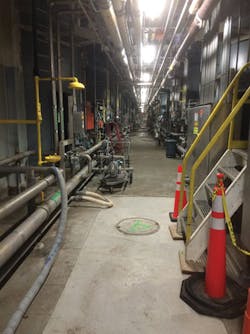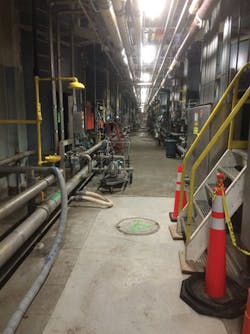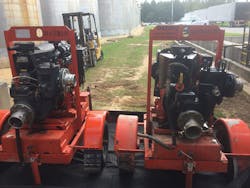Keep the Beers Flowing
By Hunter Powell
For any industrial or manufacturing process, whether it’s an oil refinery, an automobile plant, or a food and beverage processing facility, uptime is key to keeping the operation profitable. Downtime is money down the drain. So when a national beer brewery in Georgia needed to address deterioration of some of its drain pipes off the fermentation tanks, keeping the plant up and running - and the 25,000 barrels a day flowing - was a key consideration to a successful repair or replacement effort.
The huge, 35-year-old facility produces up to 10 million barrels of beer annually under a number of different beer labels, and the complex maze of pipes and process equipment twists and turns throughout the plant - from intake of raw materials to final product packaging and discharge of by-products. Toward the end of the process, the header pipes from the fermentation tanks flow into a trunk line within the plant. Once it exits the building, the trunk line feeds into the plant sewer line, which carries processing by-product and waste streams to the on-site wastewater treatment facility.
As the tanks are cleaned several times a day and prepped for processing another batch of beer, the header pipes are subjected to powerful bursts of very hot and high-pH discharge. Decades of wear and tear on the pipes have caused some of the lines to weaken and deteriorate, so Popham Mechanical Contractors Inc. was brought in to oversee the replacement project, to get it done right and to keep the beer on tap.
Calling in the Experts
In order to access and ultimately repair/replace the header pipes without disrupting the brewing process, the Popham team needed to implement a bypass pumping operation. The last thing they wanted to worry about was shutting down the plant if the bypass failed, so the call was made to the local Xylem branch, the experts on pump rental and bypass operations.
Senior Sales Engineer Jay Andrade and the Xylem engineers had to design a bypass for each of the five header pipes, and each bypass needed to handle upwards of 1.2 million gallons per day. The solution that was implemented consisted of two Godwin stainless-steel, diesel-driven pumps per pipe. There was one primary pump and one redundant pump as a back-up, and stainless steel was chosen to address the high pH of the intake stream. To optimize pump operating efficiency, each of the pumps was fitted with auto-start controls, which not only started up the pumps when they were blasted with the sudden force of the cleaning discharge but also maintained appropriate pump speed depending on flow rates. The pumps were also outfitted with a Godwin auto-dialer, designed to alert the user if the pump operating functions were approaching dangerous levels.
Due to space constraints inside the facility, the 10 Godwin pumps were installed outside the plant walls. As a result, 300 feet of six-inch chemical hose had to run from the pumps to the tanks inside, meandering between process and plant equipment, carefully navigating the landscape so as not to disrupt plant operations.
The cleaning fluid running through the header pipe bypass came in at over 120 degrees. The high temperature would impact the suction lift of the diesel pumps, so cold water bursts were introduced to the intake line before it was pumped, further improving pump efficiency.
Phase II on Tap
While the Popham and Xylem teams were on site for the internal bypass, the brewing company decided it would make sense to also have the sewer line from the plant to the on-site wastewater treatment plant inspected, as it was also in need of possible repair or replacement.
Once again the Xylem engineers were brought in to assess the scenario and design a bypass that would minimize downtime. The solution, to handle upwards of 1,500 gallons per minute through the sewer line, was two Godwin CD225M stainless-steel, diesel-driven pumps and 600 feet of 12-inch HDPE pipe. Since the bypass was above ground and ran through the plant property, there were also a number of road ramps that were brought in and set up over the pipe where it crossed driveways, in order to keep traffic moving as necessary around the plant.
Peace of Mind
With Xylem’s assistance in providing the complexities of the bypass pumps, Popham Mechanical and its team of contractors didn’t have to worry about a bypass failure or plant shutdown. They could focus on the pipe repair and replacement. And the plant employees, over 500 strong, could continue to focus on what they do best: produce quality beer, keep the barrels flowing, and keep the plant online.
“Jay and the Xylem team came in, made an assessment, recommended the right rental pump for the job, and provided the right equipment for the bypass operations - for both the inside and outside projects,” said Jeff Lewis, president of Popham Mechanical Contractors. “Their expertise allowed us to focus on getting the repair and replacement projects done, and provided the plant with peace of mind about their daily plant operations. They could be up and running throughout the entire four-month project, and that kept everybody happy.”
About the Author: Hunter Powell is the senior applications engineer for the Southeast region for Xylem Dewatering. He can be reached at [email protected].



